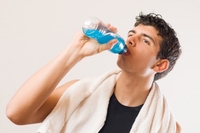 In response to "Energy Drinks: What Teenagers (and Their Doctors) Should Know," an article to be published in the February issue of Pediatrics in Review, the American Beverage Association issued the following statement:
In response to "Energy Drinks: What Teenagers (and Their Doctors) Should Know," an article to be published in the February issue of Pediatrics in Review, the American Beverage Association issued the following statement:"This paper contains misinformation about energy drinks," the ABA response notes, "and does nothing to address the very serious problem of underage drinking and excessive alcohol consumption among young adults. Moreover, ABA member companies manufacture non-alcoholic beverages -- including energy drinks. Contrary to the misperception perpetuated by this paper, most mainstream energy drinks contain only about half the amount of caffeine of a similar size cup of coffeehouse coffee. Energy drinks, their ingredients and labeling also are regulated by the U.S. Food and Drug Administration. Importantly, the American Beverage Association has adopted, and encourages all energy drink companies to adopt, a Guidance for the Responsible Labeling and Marketing of Energy Drinks. Under this Guidance, companies voluntarily display caffeine amounts from all sources on their packages along with an advisory statement that the product is not intended or recommended for children, pregnant or nursing women and persons sensitive to caffeine.
"Let's stick with the facts," the ABA concludes, "rather than perpetuating sensational untruths which attempt to blur the line between energy drinks and alcoholic beverages."





